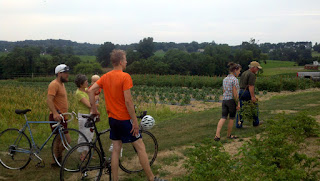We spent a lovely few days over the 4th of July weekend with Suz and Ari and little Lewis in Lancaster, PA. It was great to be connected to a fun family unit for the weekend, which included a pool-party, BBQ, fireworks, backyard board games, good food and drink, bike rides, neighborhood strolls, creek swims, and a tour of Suz's dad Dale's farm.
We were lucky enough be in Lancaster County, Pennsylvania while Horse Progress Days was in the area. Mostly attended by Amish or Mennonites who already farm with horses instead of tractors, there is a rising number of the English (non-Amish) who attend because they are interested in switching from tractor to horse.
We attended several seminars - one, facilitated by Amish author David Kline, compared tractors to horses, mostly through technical stories that were too deep for our comprehension. A woman from Ontario dumbed things down a bit for us when she explained the smile on her husband's face when coming in from a day in the field with his horses - a smile that was never there as he dismounted their tractor in previous years. As joyful as working with these animals can be, we also heard examples of it being financially viable. Suz's dad (who organizes much of Horse Progress Days and whose passion for horses is very visible) shared with us more pros of using horses, saying that tractors just take, take, take, while horses are a much more responsible part of a farm, putting nutrients back into the soil as they graze or by using their manure for fertilizer.
We attended several seminars - one, facilitated by Amish author David Kline, compared tractors to horses, mostly through technical stories that were too deep for our comprehension. A woman from Ontario dumbed things down a bit for us when she explained the smile on her husband's face when coming in from a day in the field with his horses - a smile that was never there as he dismounted their tractor in previous years. As joyful as working with these animals can be, we also heard examples of it being financially viable. Suz's dad (who organizes much of Horse Progress Days and whose passion for horses is very visible) shared with us more pros of using horses, saying that tractors just take, take, take, while horses are a much more responsible part of a farm, putting nutrients back into the soil as they graze or by using their manure for fertilizer.
Another seminar was led by Jeff Moyer - director of farm operations at Rodale Institute which was founded in 1947 with the mission to improve the health and well being of people and the planet through organic leadership. He addressed transitioning farms from conventional to organic methods. True to the Rodale mission, he stressed the facts about organic farms being better for people and the planet while also highlighting the fact that organic farming can be more profitable as well.
The seminars were good, but it was awesome to see the horses in action, up to 4 abreast, tedding, raking hay into windrows, baling... all with real horse power (sometimes implements are still powered by a generator).




No comments:
Post a Comment